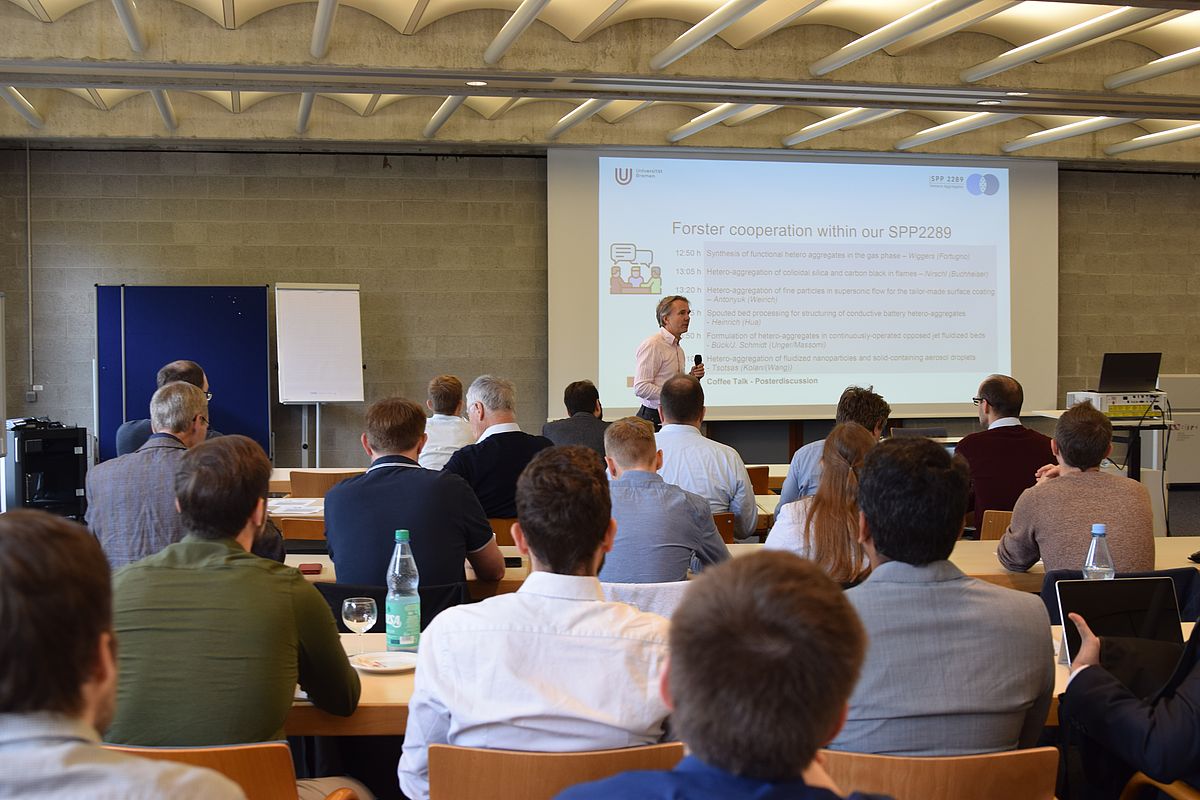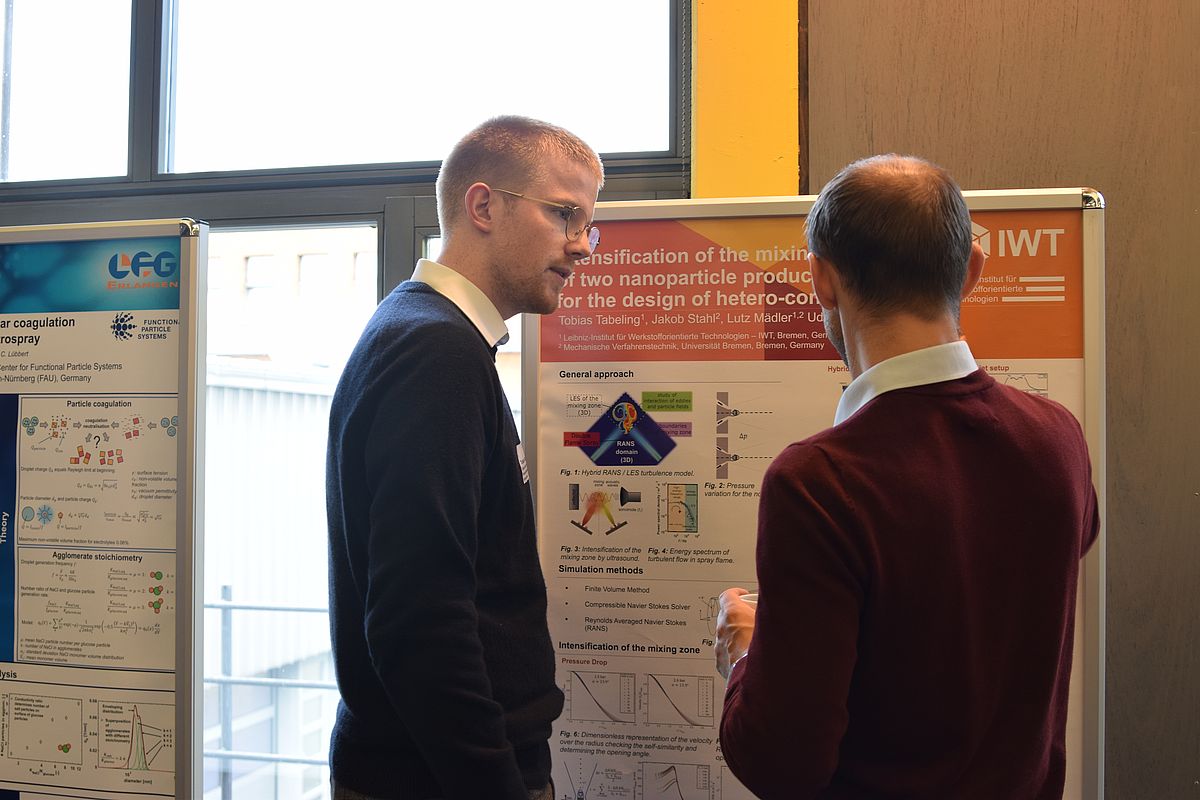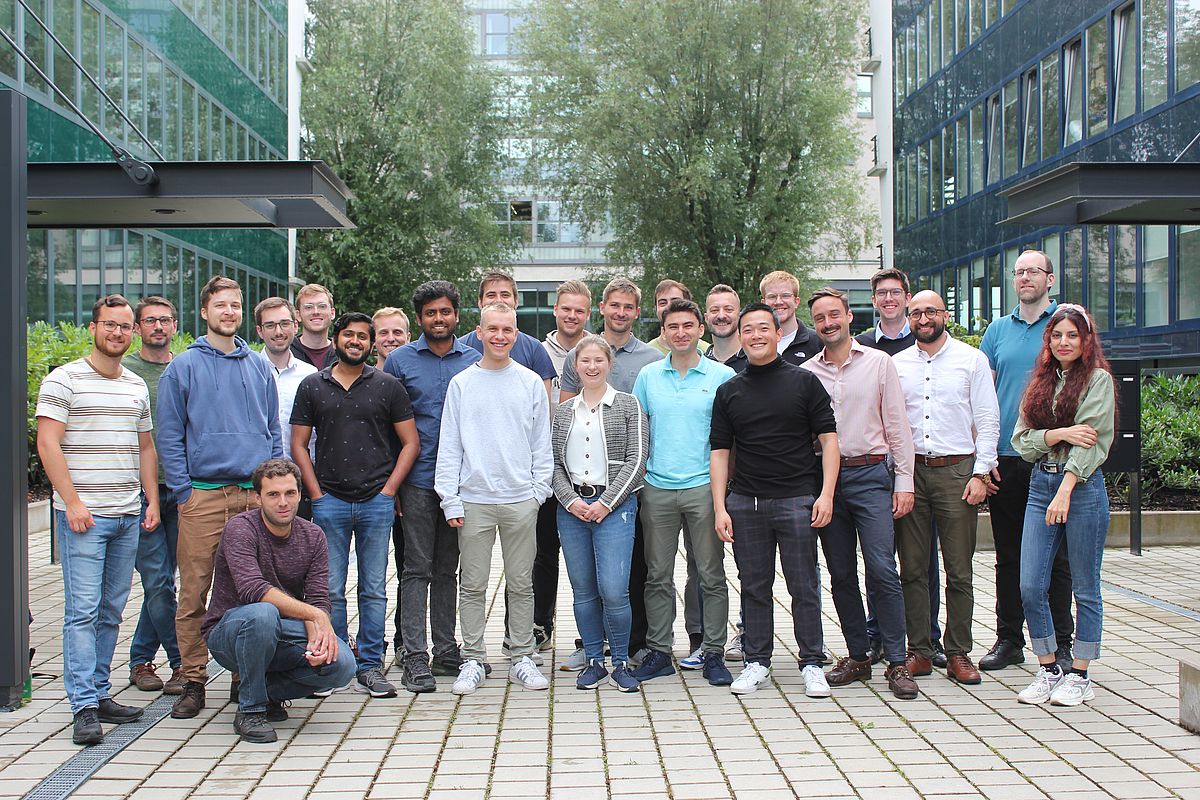Events
SPP 2289 Events
This event is part of the interactive workshop series. Participation only after registration for the entire event series.
Target group: Scientific staff of the priority programs 1980, 2045, 2289 and 2315 - presentation language English.
Collaborative event of the four priority programs for career planning and networking of the scientific staff.
Participation, input and requests for thematic focal points from the ranks of the participants are expressly desired.
Today, a scientific career is characterized by increasing complexity, long times of temporary contracts, rapid change and intense
competition. In order to be successful, scientists need to come along with a high degree of self-confidence and self-efficacy and
make themselves and their research visible. However, especially for young scientists this oftentimes poses a big challenge.
The workshop is directed towards junior scientists who want to pursue a scientific academic career. With theoretic input and
exercises (individual, partner) the participants will reflect upon their competences and expertise regarding their research and will
learn ways to gain self-confidence and self-efficacy to become visible in the scientific community and beyond.
Lecturer: Professor Annette Kolb, Coachademics
Further information coming soon.
Location:
BITZ Bremer Innovations- und Technologiezentrum
Fahrenheitstr. 1
28359 Bremen
This event is part of the interactive workshop series. Participation only after registration for the entire event series.
Target group: Scientific staff of the priority programs 2045, 2315, 2289 und 2364 - presentation language English.
Collaborative event of the four priority programs for career planning and networking of the scientific staff.
Participation, input and requests for thematic focal points from the ranks of the participants are expressly desired.
This workshop will be led by Barbara Wietasch.
Cooperative learning (everyone has their own goal) and collaborative learning (everyone works towards the same goal), where the knowledge of many comes together and innovation and creativity can emerge.
There will be a 2-hour interactive workshop introducing various learning formats in Learning Circles, an absolute trend topic triggered by the well-known formats such as Working Out Loud, New Work Mindset and New Work Mindset (+) Learning Journeys, LernOS and many more. In a dynamic and complex working world, skills have become the most valuable resource. This makes learning itself an essential key competence. Collaborative learning is a particular focus nowadays, as it supports learning motivation, transfer to everyday working life, reflection, etc. Collaborative learning in Learning Circles addresses precisely this issue, as they bring together people with similar interests and learning goals.
Barbara Wietasch is a senior consultant, executive coach, facilitator, WOL coach and author. She has over 20 years of experience in organisational and personnel development and supports people, teams and organisations as a coach, trainer and consultant.
This event is part of the interactive workshop series. Participation only after registration for the entire event series.
Target group: Scientific staff of the priority programs 2045, 2315, 2289 und 2364 - presentation language English.
Collaborative event of the four priority programs for career planning and networking of the scientific staff.
Participation, input and requests for thematic focal points from the ranks of the participants are expressly desired.
This workshop will be held by Dr. Christiane Attig of the NaWik, it will give an introduction to science communication, with an interactive exercise.
Dr. Christiane Attig holds a PhD in psychology and is currently a research associate at the University of Lübeck. Since 2018, she has developed and produced several podcasts dedicated to conveying knowledge of psychological findings and methods as well as making visible the life and career paths of women and non-binary individuals in science. She also conducts research on the personality and motivation of podcast producers and has used social media for science communication for several years.

Organisation: Friedrich-Alexander-Universität Erlangen-Nürnberg ; Simon Aßmann, Ali Massomi, Matthias Kawalek
Target group: PhD students SPP 2289
On-site event in Erlangen.
This event is part of the interactive workshop series. Participation only after registration for the entire event series.
Target group: Scientific staff of the priority programs 2045, 2315, 2289 und 2364 - presentation language English.
Collaborative event of the four priority programs for career planning and networking of the scientific staff.
Participation, input and requests for thematic focal points from the ranks of the participants are expressly desired.
Discussion guests for today's workshop are:
Prof. Dr rer. nat. Kerstin Avila, Professor for Turbulence and Complex Systems at Carl von Ossietzky Universität Oldenburg
Kerstin Avila studied meteorology and physics in Kiel a completed her doctorate in 2013 at the Max-Planck-Institute for Dynamics and Self-Organization in Göttingen and the University of Göttingen. Afterwards, she visited the Institute of Science and Technology in Vienna (IST Austria) as a guest scientist and held research positions at the University of Erlangen-Nuremberg and at the University of Bremen (Center of Applied Space Technology and Microgravity (ZARM) & Particles and Process Engineering). Her research focuses on turbulence and flow instabilities. Since March 2023 she is Professor at the University Oldenburg. Kerstin Avila is a reviewer for several journals as well as for the German Research Foundation (DFG) and has two children.
Prof. Dr.-Ing. Samir Salameh, Professor for Particle Technology and Recycling Economy at Fachhochschule Münster
Samir Salameh studied Industrial Engineering and Management at the University Bremen and stayed on as a research assistant in the Particles and Process Engineering group. After his doctoral thesis he worked as a postdoctoral scientist at the Technische Universiteit Delft for two years, followed by three years as project leader at Saint-Gobain Sekurit in Herzogenrath. Since September 2021 he is Professor at the FH Münster.
Details will follow
This event is part of the interactive workshop series. Participation only after registration for the entire event series.
Target group: Scientific staff of the priority programs 2045, 2315, 2289 und 2364 - presentation language English.
Collaborative event of the four priority programs for career planning and networking of the scientific staff.
Participation, input and requests for thematic focal points from the ranks of the participants are expressly desired.
Compiling scientific papers – a fresh approach to your writing style (II)
The second workshop builds on the impulses of workshop I and offers the opportunity to interactively work on selected issues on the students’ individual papers.
It will be held by Anja Kaufmann.
This event is part of the interactive workshop series. Participation only after registration for the entire event series.
Target group: Scientific staff of the priority programs 2045, 2315, 2289 und 2364 - presentation language English.
Collaborative event of the four priority programs for career planning and networking of the scientific staff.
Participation, input and requests for thematic focal points from the ranks of the participants are expressly desired.
Compiling scientific papers – a fresh approach to your writing style (I)
• planning and structuring papers on a macro and micro level
• considering the hierarchy of information,
• avoiding interpretation need by the reader,
• breaking down information into semantic units and avoiding redundancies.
• linguistic as well as cultural patterns when writing a scientific paper
• achieving consistency and keeping the reader’s attention best
It will be held by Anja Kaufmann.
This event is part of the interactive workshop series. Participation only after registration for the entire event series.
Target group: Scientific staff of the priority programs 2045, 2315, 2289 und 2364 - presentation language English.
Collaborative event of the four priority programs for career planning and networking of the scientific staff.
Participation, input and requests for thematic focal points from the ranks of the participants are expressly desired.
This workshop gives impulses on gaining skills for successfully and sustainably presenting scientific findings and research results in front of larger audiences with a specific focus on conferences/conventions. Attention will be given to these issues:
• planning your presentation by defining the form of your presentation, addressing target audience, purpose, mission and benefit
• alternative forms of openings and ending to attract attention and make a memorable impression
• structuring presentations (signposting, transitions to guide the audience)
• creating visuals
Lecturer: Anja Kaufmann
This date is part of the interactive workshop series. Participation only after registration.
Target group: Scientific employees of the priority programs 1980, 2045, 2289 and 2315.
In the first part of the workshop, participants will learn the basics of self-regulation & the window of tolerance. In the second part the participants will learn techniques that are as easy as possible to implement in everyday life (inclusive self-experience).
The topic is “Self-regulation”, and it will be held by Julia Schreier.
Kindly note that this course will be held in German.
This date is part of the interactive workshop series. Participation only after registration.
Target group: Scientific employees of the priority programs 1980, 2045, 2289 and 2315 - lecture language English.
In this seminar you will be introduced to a selection of transfer-relevant funding programs and how you can find further, topic-specific programs for the implementation of your project. You will be given hints and experience for a potential application by the lecturers.
Lecturers are Isabel Schulze and Thomas Klotz from SAXEED; TU Bergakademie Freiberg.


Venue: BITZ, Bremen
Start on 12 October 11:30 a.m. End on 13 October 12:15 p.m.
This date is part of the interactive workshop series. Participation only after registration.
Target group: Scientific employees of the priority programs 1980, 2045, 2289 and 2315 - lecture language English.
The aim of this workshop is to develop a common understanding of resilience and to explore one of the most well-known concepts of resilience and how this can be applied to handle difficult situations effectively.
It will be held by Kathrin Hombach.

Target group: PhD students SPP 2289
On-site event in Hamburg.
This event is part of the interactive workshop series. Participation only after registration for the entire event series.
Target group: Scientific staff of the priority programs 1980, 2045, 2289 and 2315 - presentation language English.
Collaborative event of the four priority programs for career planning and networking of the scientific staff.
Participation, input and requests for thematic focal points from the ranks of the participants are expressly desired.
Lecturer : Franziska Böhler / Blackpoint Consulting
Speaker: Dr. Norbert Riefler
Language: Englisch
Target group: Young Researcher SPP 2289 - (Prep course for the Summerschool 2023)
This event is part of the interactive workshop series. Participation only after registration for the entire event series.
Target group: Scientific staff of the priority programs 1980, 2045, 2289 and 2315 - presentation language English.
Collaborative event of the four priority programs for career planning and networking of the scientific staff.
Participation, input and requests for thematic focal points from the ranks of the participants are expressly desired.
Lecturer : Franziska Böhler / Blackpoint Consulting
This event is part of the interactive workshop series. Participation only after registration for the entire event series.
Target group: Scientific staff of the priority programs 1980, 2045, 2289 and 2315 - presentation language English.
Collaborative event of the four priority programs for career planning and networking of the scientific staff.
Participation, input and requests for thematic focal points from the ranks of the participants are expressly desired.
Discussion guests for today's workshop are:
Dr. Simon Jörres, German Research Foundation (DFG) -Engineering Sciences
Anja Kleefuß, German Research Foundation (DFG)- Engineering Sciences
Target group: PhD students of the SPP 2289
Registration in the forum of the SPP
Speaker: Professorin Dorit Schmidt
The major objective of the workshop “Good Scientific Practice” is to know and understand the basic rules and values of the responsible conduct of research in all its stages, according to local, national, and international regulations and guidelines. The participants will explore the differences and grey areas between good scientific practice, questionable research practice, and scientific misconduct. They will learn about the consequences of scientific misconduct. The content of the workshop follows the curriculum “Good Scientific Practice” which was commissioned by and developed in cooperation with the German Research Association:
Definitions of good scientific practice and scientific misconduct
·Data and source management
·Authorship and the process of publication
·Mentoring and supervision
·Conflict management: how to deal with scientific misconduct
·Consequences
Type: online workshop, including individual and group work, presentations, discussions
Time frame: 9:00 - 16:00 p.m. including 1.5 hour breaks
This event is part of the interactive workshop series. Participation only after registration for the entire event series.
Target group: Scientific staff of the priority programs 1980, 2045, 2289 and 2315 - presentation language English.
Collaborative event of the four priority programs for career planning and networking of the scientific staff.
Participation, input and requests for thematic focal points from the ranks of the participants are expressly desired.
Discussion guests for today's workshop are:
Prof. Dr.-Ing. Samir Salameh, Professor for Particle Technology and Recycling Economy at FH Münster
Dr. Martin Rudolph, Head of Processing at the Helmholtz-Zentrum Dresden-Rossendorf/ Helmholtz Institute Freiberg for Resource Technology
This event is part of the interactive workshop series. Participation only after registration for the entire event series.
Target group: Scientific staff of the priority programs 1980, 2045, 2289 and 2315 - presentation language English.
Collaborative event of the four priority programs for career planning and networking of the scientific staff.
Participation, input and requests for thematic focal points from the ranks of the participants are expressly desired.
Discussion guests for today's workshop are:
Dr.-Ing. Henrike Großmann, Team Leader Quality Assurance Shell/Surface, Daimler AG - Mercedes Benz Cars
Dr. Andreas Kopf, Transport Modeller/Analyst, International Transport Forum (OECD)
Lecturer: Dr. Theresa Schredelseker
Target group: Scientific staff of the priority programs 1980, 2045, 2289 and 2315.
Joint event of the four priority programs for career planning and networking of the scientific staff.
Co-design, input and requests for thematic focal points from the ranks of the participants are expressly desired.
Lecturer: Prof. Dr. Doris Segets.
Introduction to the idea behind the workshop series and further procedure.
Target group: Scientific staff of the priority programs 1980, 2045, 2289 and 2315.
Joint event of the four priority programs for career planning and networking of the scientific staff.
Co-design, input and requests for thematic focal points from the ranks of the participants are expressly desired.

Venue: BITZ, Bremen
Start on 05 October 12:00 p.m. End on 06 October 01:00 p.m.
The second annual meeting of the priority program offers opportunities for exchange, networking and cooperation ideas within the SPP. The focus is on the presentation of the development status of all projects involved and a discussion of the common challenges. Presentations, poster sessions and evening event.
Greg Bewley
Sibley School of Mechanical and Aerospace Engineering
Cornell University
Ithaca, NY
Professor Bewley is the Mercator Fellow of PP 2289 and studies turbulence and its effects on the environment and engineered devices by performing laboratory and field experiments. Bewley developed interests in superfluid turbulence while earning his PhD from Yale University, and in turbulent atmospheric clouds while working at the Max Planck Institute for Dynamics and Self-Organization in Germany. At Cornell, he is pursuing new opportunities in discovering the way turbulence behaves differently at high speeds than at low ones, and in the way we can engineer strategies to navigate turbulent flows while in flight.
Organisation: Team Bremen - Jakob Stahl, Tobias Tabeling
Target group: PHD students SPP 2289
Presence event in Bremen.
Details following
Organisation: Team Bremen - Jakob Stahl, Tobias Tabeling
Target group: Young Researchers
First summer school of the priority program. The project workers (Young Researchers) exchange information about their current state of research and future cooperation and develop a common glossary.
Workshop: Efficient and sustainable handling of data, introduction to the Electronic Laboratory Notebook - Speaker: Professor Norbert Riefler.
Speaker: Professorin Dorit Schmidt
The major objective of the workshop “Good Scientific Practice” is to know and understand the basic rules and values of the responsible conduct of research in all its stages, according to local, national, and international regulations and guidelines. The participants will explore the differences and grey areas between good scientific practice, questionable research practice, and scientific misconduct. They will learn about the consequences of scientific misconduct. The content of the workshop follows the curriculum “Good Scientific Practice” which was commissioned by and developed in cooperation with the German Research Association:
Definitions of good scientific practice and scientific misconduct
·Data and source management
·Authorship and the process of publication
·Mentoring and supervision
·Conflict management: how to deal with scientific misconduct
·Consequences
Type: online workshop, including individual and group work, presentations, discussions
Time frame: 9:00 - 16:00 p.m. including 1.5 hour breaks
The first annual meeting of the priority program offers opportunities for exchange, networking and initial ideas for cooperation within the SPP. The focus is on presenting all the projects involved and discussing the common challenges. Workshops, evening event
Location: Bremen
BITZ Bremen innovation and technology center
Fahrenheit Street 1
28359 Bremen

